![By Tungsten (photo taken by Tungsten) [Public domain], via Wikimedia Commons Header image Educatie en Communicatie in de Bètawetenschappen](/education/studyprogram-images/msc-educatie-communicatie-wiskunde.jpg)
Hoe leg je een ingewikkelde kwestie over erfelijkheid uit aan de lezers van je krant? Wat heeft die leerling nodig om toch zijn algebrasommen te snappen? Hoe vertel je aansprekend over waterbeheer?
Deze master bereidt je voor op een loopbaan in de communicatie over natuurwetenschappen of het onderwijs in de bètavakken.
Binnen de master zijn maar liefst zes verschillende tracks beschikbaar: één in communicatie en vijf in educatie (Biologie, Informatica, Natuurkunde, Scheikunde en Wiskunde). Alle tracks hebben enkele vakken als gezamenlijke basis (bijvoorbeeld Vaardigheden of Ontwerpen), maar verder zijn de verplichte vakken per track verschillend.
De kennis die je hebt verworven in je bèta-georiënteerde
bacheloropleiding is voor een breed publiek relevant. Met de
masteropleiding Educatie en Communicatie in de
bètawetenschappen verdiep en verbreed je je bètakennis
én leer je hoe je die kennis kunt overbrengen.
In de vakken die je in de opleiding volgt, maak je kennis met
allerlei aspecten van wetenschapscommunicatie en -educatie. Daarbij
kun je denken aan het ontwerpen van educatief materiaal, de rol van
allerlei soorten media binnen wetenschapscommunicatie en onderzoek
op het gebied van bètacommunicatie en -educatie.
Kenmerkend voor de masteropleiding zijn interactieve colleges en
praktische, realistische opdrachten. Tijdens gastcolleges kom je in
contact met professionals uit je toekomstige werkveld.
Luister de podcast (Engels) met onze student Miley over haar ervaringen in de Education Master!
Onze zes tracks starten met een gezamenlijk deel. Iedereen doet een bèta-wetenschappelijk onderzoek in de eigen vakrichting. In het vak Skills in Science Communication leer je mondeling en schriftelijk communiceren. Het vak Design for Science Education and Communication gaat over het ontwerpproces van een website of lesmateriaal. Inleiding Onderzoek WTEC gaat in op onderzoeksmethoden.
Het programma duurt twee jaar en bestaat uit 120 ECTS.
| Programma-opties |
|---|
| Bèta-educatie (track) De specialisatie educatie bestaat deels uit vakken van de lerarenopleiding. Om je goed voor te bereiden op een baan in het onderwijs doe je in het eerste jaar de Basiscursus voor de lerarenopleiding. Onderdeel van deze cursus is een stage op school. Het afsluitende jaar van de educatierichting is het Werkenleren traject. Je geeft les aan een aantal klassen in het voortgezet onderwijs. Je bent zelf verantwoordelijk voor de lessen in deze klassen, maar je hebt begeleiding op school en vanuit de opleiding. Je doet zodoende veel praktijkervaring op. Op maandag en vrijdag zijn er opleidingsactiviteiten zoals vakdidactiek, pedagogiek en intervisiebijeenkomsten. Voor meer informatie specifiek over de stages en het Werkenleren traject kun je ook terecht op de website van de Lerarenopleiding: http://www.rug.nl/education/lerarenopleiding/ Voor het complete curriculum, zie: https://ocasys.rug.nl/current/catalog/programme/60708-5502 |
| Bèta-communicatie (track) In de communicatie tracks leer je om op te treden als intermediair tussen wetenschap en technologie enerzijds, en het niet-gespecialiseerde publiek anderzijds. Tijdens de opleiding verdiep je je in de positie van natuurwetenschappen in de maatschappij, in de historische achtergronden en de huidige stand van het natuurwetenschappelijk onderzoek. Je krijgt te maken met risicocommunicatie en publieke debatten in het vak Wetenschap communicatie en maatschappij. Tijdens de vakken Wetenschapsvoorlichting en -journalistiek en Wetenschap in beeld orienteer je je op de voornaamste routes waarlangs wetenschappelijke kennis de samenleving bereikt. Denk daarbij aan de geschreven pers, musea, internet, radio en tv. In de Externe Opdracht Wetenschapscommunicatie werk je gedurende een aantal weken voor een externe opdrachtgever. Je bent hierbij erg vrij in je keuze bij wie je de opdracht doet en wat je precies gaat doen. Veel studenten gaan werken voor een populairwetenschappelijk tijdschrift, voor een museum of website of voor een radio- of televisieprogramma. De communicatie-tracks zijn gedeeltelijk tweetalig: de cursussen worden in het Engels gegeven, maar bij sommige cursussen kun je kiezen om de opdrachten in het Nederlands of in het Engels in te leveren. Om de verschillende tracks inhoudelijk te vergelijken, zie: https://ocasys.rug.nl/current/catalog/programme/60708-5501 |
| Vooropleiding | Organisatie | Instroom |
|---|---|---|
| Biologie | Alle WO instellingen |
Toelating onder voorwaarden Extra informatie:Communicatietrack drempelloos, educatietrack onder voorwaarden. Neem contact op met studie-adviseur. |
| Life Science and Technology | Alle WO instellingen |
Toelating onder voorwaarden Extra informatie:Communicatietrack drempelloos, educatietrack onder voorwaarden. Neem contact op met studie-adviseur. |
| Informatica | Alle WO instellingen |
Toelating onder voorwaarden Extra informatie:Communicatietrack drempelloos, educatietrack onder voorwaarden. Neem contact op met studie-adviseur. |
| Technische Wiskunde | Alle WO instellingen |
Toelating onder voorwaarden Extra informatie:Communicatietrack drempelloos, educatietrack onder voorwaarden. Neem contact op met studie-adviseur. |
| Technische Natuurkunde | Alle WO instellingen |
Toelating onder voorwaarden Extra informatie:Communicatietrack drempelloos, educatietrack onder voorwaarden. Neem contact op met studie-adviseur. |
| Kunstmatige Intelligentie | Alle WO instellingen |
Toelating onder voorwaarden Extra informatie:Communicatietrack drempelloos, educatietrack onder voorwaarden. Neem contact op met studie-adviseur. |
| Sterrenkunde | Alle WO instellingen |
Toelating onder voorwaarden Extra informatie:Communicatietrack drempelloos, educatietrack onder voorwaarden. Neem contact op met studie-adviseur. |
| Scheikundige Technologie | Alle WO instellingen |
Toelating onder voorwaarden Extra informatie:Communicatietrack drempelloos, educatietrack onder voorwaarden. Neem contact op met studie-adviseur. |
| Scheikunde | Alle WO instellingen |
Toelating onder voorwaarden Extra informatie:Communicatietrack drempelloos, educatietrack onder voorwaarden. Neem contact op met studie-adviseur. |
| Wiskunde | Alle WO instellingen |
Toelating onder voorwaarden Extra informatie:Communicatietrack drempelloos, educatietrack onder voorwaarden. Neem contact op met studie-adviseur. |
| Natuurkunde | Alle WO instellingen |
Toelating onder voorwaarden Extra informatie:Communicatietrack drempelloos, educatietrack onder voorwaarden. Neem contact op met studie-adviseur. |
| Farmacie | Alle WO instellingen |
Toelating onder voorwaarden Extra informatie:Communicatietrack drempelloos, educatietrack onder voorwaarden. Neem contact op met studie-adviseur. |
| Vooropleiding | Organisatie | Instroom |
|---|---|---|
| Biomedische Technologie | Rijksuniversiteit Groningen | Drempelloze toelating |
| Specifieke eisen | Extra informatie |
|---|---|
| vooropleiding |
Universitair bachelordiploma in wiskunde, informatica, kunstmatige intelligentie, natuurkunde, sterrenkunde, scheikunde, biologie, farmacie, technische opleidingen, of gerelateerde disciplines. De masteropleiding Educatie en Communicatie in de Bètawetenschappen is toegankelijk voor iedereen die een bachelordiploma van een bèta-opleiding heeft behaald aan een universiteit in Nederland. Omdat er een grote diversiteit is aan zulke opleidingen zal de toelatingscommissie altijd beslissen over toelating. In sommige gevallen kan het zijn dat je voor de educatierichting nog extra vakken moet doen om te beschikken over voldoende (brede) kennis. Daarom is altijd een toelatingsverzoek nodig voor de educatierichting; de toelatingscommissie beslist over welke aanvullende vakken vereist zijn. Informatie over mogelijke toelating na HBO vind je op: https://www.rug.nl/fse/msc-admission |
| minimum kennis |
Voor het volgen van de lerarenopleidingsvariant (Tracks Educatie) kunnen aanvullende eisen worden gesteld, te bepalen door de toelatingscommissie. |
| overige toelatingseisen |
In principe ben je NIET toelaatbaar tot de Educatie-tracks met:
Het schakeltraject naar de master Science Education and Communication is dan te groot. Een 1e-graads bevoegdheid (bijv. in de wiskunde) kun je dan alleen nog behalen via een hbo-master lerarenopleiding. Slechts enkele hbo-opleidingen geven wel toelating na een schakelprogramma:
Staat jouw opleiding niet in dit rijtje, maar denk je dat je toch een hbo-bachelordiploma hebt dat zeer bètawetenschappelijk is, neem dan contact op met de studieadviseur. Heb je al een universitair masterdiploma in een bèta-richting? Dan is er een éénjarig programma mogelijk via de LVHO. Voor overige routes naar het docentschap, zie hier. |
Kies je voor de specialisatie educatie dan moet je ook een voldoende brede vooropleiding hebben in het vak waar je leraar in wilt worden. Dit wordt in samenspraak met de opleidingen van de Faculteit vastgesteld. Het is mogelijk dat de toelatingscommissie eist dat je aanvullende bachelorvakken eerst haalt zodat je vooropleiding breed genoeg is en jij toelaatbaar bent.
Wil je een snelle beslissing over je toelatingsverzoek? Wacht niet tot 1 mei, maar maak gebruik van de vroegere deadlines van deze masteropleiding (start op 1 september). Als de Rijksuniversiteit Groningen je complete aanvraag voor onderstaande data aanlevert, krijg je een maand later te horen wat de beslissing is.
1 december– 15 januari
1 februari – maart
15 maart – 15 april
1 mei - 15 juni
| Type student | Deadline | Start opleiding |
|---|---|---|
| Nederlandse studenten | 01 mei 2024 | 01 september 2024 |
| 15 oktober 2024 | 01 februari 2025 | |
| 01 mei 2025 | 01 september 2025 | |
| 15 oktober 2025 | 01 februari 2026 | |
| EU/EEA studenten | 01 mei 2024 | 01 september 2024 |
| 15 oktober 2024 | 01 februari 2025 | |
| 01 mei 2025 | 01 september 2025 | |
| 15 oktober 2025 | 01 februari 2026 | |
| non-EU/EEA studenten | 01 mei 2024 | 01 september 2024 |
| 15 oktober 2024 | 01 februari 2025 | |
| 01 mei 2025 | 01 september 2025 | |
| 15 oktober 2025 | 01 februari 2026 |
| Specifieke eisen | Extra informatie |
|---|---|
| vooropleiding |
Bachelor's degree programme in Mathematics, Computing Science, Physics, Astronomy, Chemistry, Biology, Pharmacy, Engineering, or related disciplines. This is merely an indication of required background knowledge. The Admissions Board determines whether the specific contents of this/these course(s) meet the admission requirements of the master programme for which you applied. |
| minimum kennis |
BEFORE YOU APPLY Make sure to visit 'MSc Application Procedure' at: https://www.rug.nl/fse/programme/admissions/msc/ for all the necessary information about the procedure and admission requirements. |
| taaltoets cijfer |
PLEASE NOTE: our language proficiency requirements differ from those of the other programmes at the Faculty of Science and Engineering. To be admitted for the Dutch-taught Education-tracks, you will need to prove your proficiency in Dutch by means of an NT2-II test. To be admitted for the English-taught Communication-track, all applicants must satisfy the following minimum scores:
For exemptions and information on how to submit your language test, please visit ….. https://www.rug.nl/fse/programme/admissions/msc/language-requirements |
| Examen | Minimum score |
|---|---|
| C1 Gevorderd (voormalig CAE) | C1 |
| IELTS gemiddelde score | 7 |
| IELTS luistervaardigheid | 6.5 |
| IELTS leesvaardigheid | 6.5 |
| IELTS schrijfvaardigheid | 7 |
| IELTS spreekvaardigheid | 7 |
Do you prefer an early decision on your request of admission? Don't wait until 1 May, but use one of the earlier deadlines for this Master's programme (for a course start on 1 September). If the University of Groningen has received your complete application before, then you will receive a decision at the latest on:
Application - Decision:
1 December– 15 January
1 February – 1 March
15 March – 15 April
1 May - 15 June
| Type student | Deadline | Start opleiding |
|---|---|---|
| Nederlandse studenten | 01 mei 2024 | 01 september 2024 |
| 15 oktober 2024 | 01 februari 2025 | |
| 01 mei 2025 | 01 september 2025 | |
| 15 oktober 2025 | 01 februari 2026 | |
| EU/EEA studenten | 01 mei 2024 | 01 september 2024 |
| 15 oktober 2024 | 01 februari 2025 | |
| 01 mei 2025 | 01 september 2025 | |
| 15 oktober 2025 | 01 februari 2026 | |
| non-EU/EEA studenten | 01 mei 2024 | 01 september 2024 |
| 15 oktober 2024 | 01 februari 2025 | |
| 01 mei 2025 | 01 september 2025 | |
| 15 oktober 2025 | 01 februari 2026 |
| Nationaliteit | Jaar | Kosten | Vorm |
|---|---|---|---|
| EU/EER | 2024-2025 | € 2530 | voltijd |
| EU/EER | 2024-2025 | € 1863 | deeltijd |
| niet EU/EER | 2024-2025 | € 24200 | voltijd |
Praktische informatie voor:
In de Educatie-tracks word je opgeleid tot eerstegraads docent in je vakgebied zoals biologie, informatica, natuurkunde, scheikunde of wiskunde, waarna je les kunt geven in het hele voortgezet onderwijs, mbo en volwassenenonderwijs. Maar ook een baan in onderwijsontwikkeling, onderzoek van onderwijs of ontwikkelen van lesmateriaal is mogelijk.
Met de Communicatie-track word je voorbereid voor een carrière in het vakgebied van de wetenschapscommunicatie. Je hebt hier veel beroepsmogelijkheden.
Alumni hebben bijvoorbeeld carrières als woordvoerder of consultants bij wetenschappelijke organisaties, werken als voorlichter bij organisaties als NWO en Astron, redacteur of journalist bij het Technisch Weekblad Zo Zit Dat! en Hoe?Zo! Radio, bij het Museon en het Natuurmuseum Nijmegen, als freelance wetenschapscommunicator of zijn het wetenschappelijk onderzoek ingegaan. Door je brede opleiding ben je ook interessant voor beleidsfuncties of werk in de kennistransfer.
Mogelijke bedrijven en organisaties zijn onder andere: scholen voor middelbaar of hoger beroepsonderwijs, natuur/wetenschapsmusea, de media, patiëntenorganisaties, onderzoek en universiteiten.
Het Institute for Science Education and Communication werkt aan een onderzoeksprogramma gericht op verbetering van het onderwijs in wiskunde en de natuurwetenschappen. Onderzoeksprojecten worden uitgevoerd in het voortgezet onderwijs en het universitair onderwijs.
Het Institute for
Science Education and Communication verzorgt onderwijs op de
gebieden bètadidactiek en wetenschapscommunicatie, o.a. in de
tweejarige master Science Education and Communication. Deze master
wordt in samenwerking met de Lerarenopleiding verzorgd.
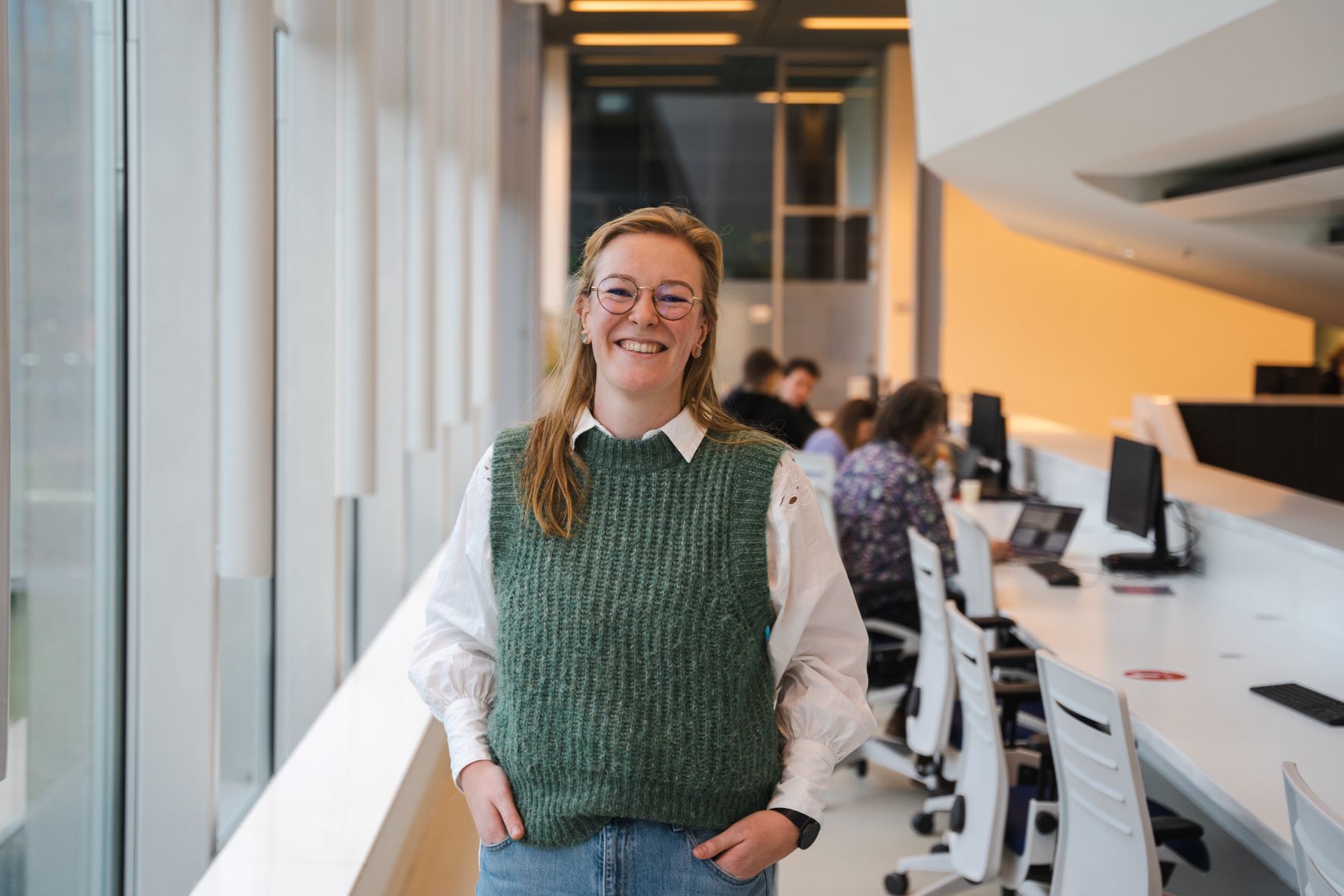
Lees verderDuring the programme, we learn a lot of different skills that are useful for future careers.
Caya Muijs - Student of the MSc Science Education and Communication (Communication track)
After finishing a Bachelor’s in Chemistry, I realized that I wasn't really into the research side of the programme but wanted to do something more related to people. When attending a Master’s market, I stumbled upon the Master’s in Science Communication and it immediately grabbed my attention! The thing that appealed to me the most was that I would learn about different aspects of science communication, like journalism, radio/TV, and science exhibits.
I really like that we work on a lot of projects that relate to a possible career. Some examples that I liked the most: I have made a video as if it was for the Dutch TV programme Het Klokhuis , I have written an article that has been published in the university paper, and I am currently doing an internship at Science Linx, where I am developing course material for primary schools.
During the programme, we learn a lot of different skills that are useful for future careers. Because of the diversity of courses, I feel that I have a good base from which to start the next step: a career in science communication!
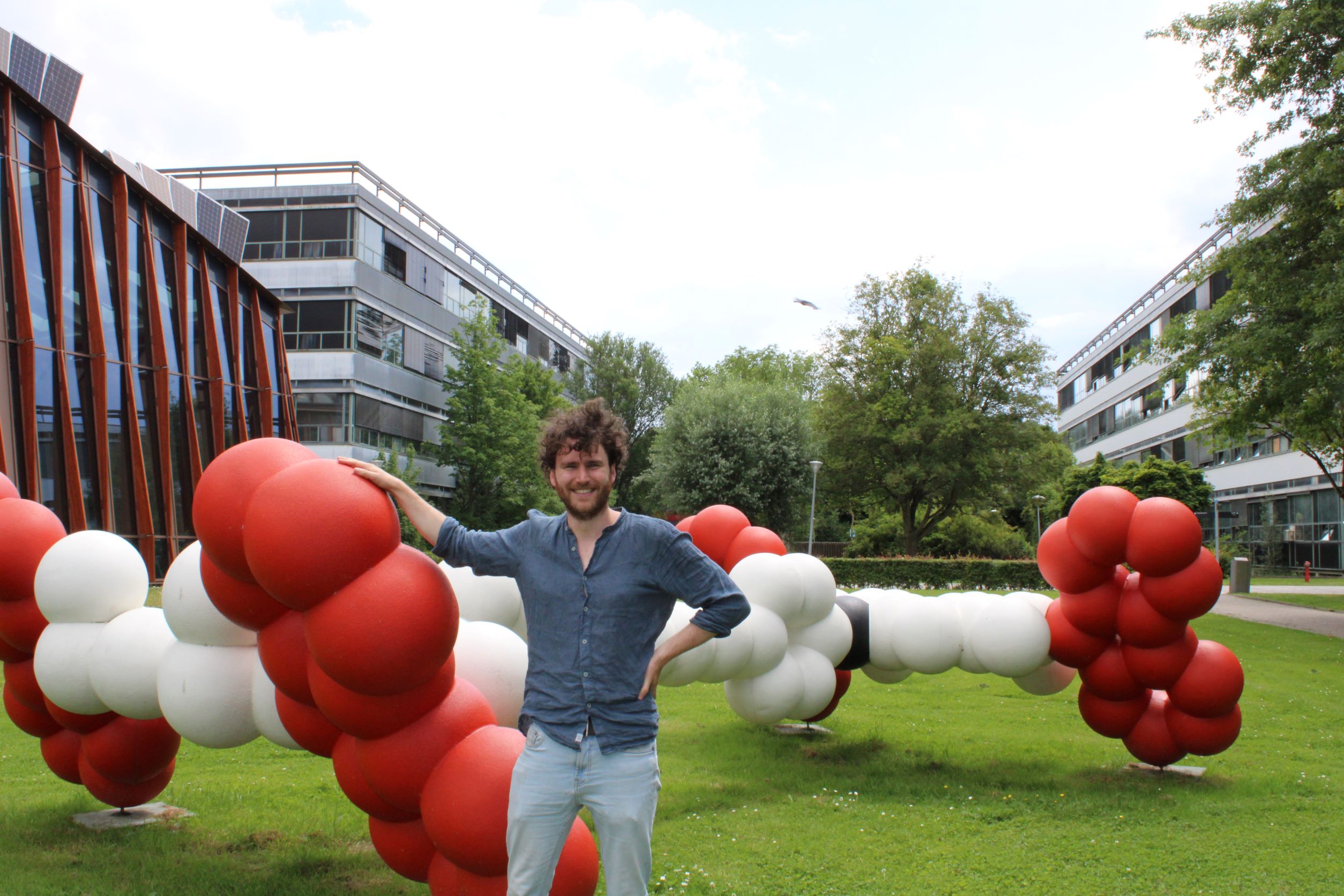
Lees verderHet is een misconceptie dat je alleen wordt opgeleid tot docent, je leert bijvoorbeeld om moeilijke dingen makkelijk uit te leggen en dat komt van pas in heel veel takken van het bedrijfsleven.'
Mattijs kreeg als kind een proefjesdoos met kleine scheikunde-experimentjes. Hij was al jong gefascineerd door de scheikunde en wilde biochemicus worden. Hij is uiteindelijk biologie gaan studeren, en wist lang niet wat hij écht wilde gaan doen na zijn bachelor. Hij had nooit aan de Master Science Education and Communication gedacht, tot hij student-assistent werd en merkte dat hij het heel erg leuk vond om dingen uit te leggen. Hij hakte pas op het laatste moment de knoop door om zich in te schrijven voor die master.
Mattijs vindt bezig zijn met zijn kennis het leukst. Hij is nog steeds gefascineerd door de biochemie, maar vind het vooral heel leuk om het er over te hebben en het uit te leggen. Hij vindt het contact met de leerlingen het allerleukste aan zijn werk. ‘Als het me lukt om een goede les neer te zetten, waarbij ik de leerlingen op een leuke manier mee krijg, dan geeft dat ontzettend veel voldoening’, zegt hij. Hij vindt het mooi dat je als docent echt iets kan bijdragen aan het leven van een leerling, vaak zonder dat je het doorhebt. Hij vindt het een heel mooi compliment als een leerling hem aan het eind van het jaar bedankt of een cadeautje geeft. Mattijs vertelt; ‘De oprechtheid van kinderen is bewonderenswaardig, je weet dat ze het dan echt menen’.
Hij vindt het erg fijn dat hij veel vrijheid heeft in zijn werk. ‘Niemand vertelt mij hoe ik mijn les moet indelen. Er zijn maar een paar eisen en regels, bijvoorbeeld dat de afsluitende toets gehaald moet worden. Er is veel ruimte om gekke dingen te doen en nieuwe lesvormen uit te proberen.’
Pas na de master drong tot hem door hoe nuttig de lessen echt waren, hij merkt nu dat hij in zijn werk alles gebruikt wat hij tijdens de opleiding geleerd heeft. De theatercursus zal hem altijd bijblijven. ‘Het is heel erg nuttig geweest om naar mezelf te kunnen kijken in een toneelstuk’, zegt hij. De colleges en andere lessen in de Master Science Education and Communication waren voor Mattijs een verademing ten opzichte van de colleges in zijn bachelor. ‘De docenten van de lerarenopleiding zijn met afstand de beste docenten die ik op de universiteit heb gehad. Je komt mensen tegen die met passie docent zijn.’
Mattijs wil graag benadrukken dat je niet per sé docent hoeft te worden of te blijven als je de Master Science Education and Communication hebt gedaan. Hij zegt; ‘Het is een misconceptie dat je alleen wordt opgeleid tot docent, je leert bijvoorbeeld om moeilijke dingen makkelijk uit te leggen en dat komt van pas in heel veel takken van het bedrijfsleven.’
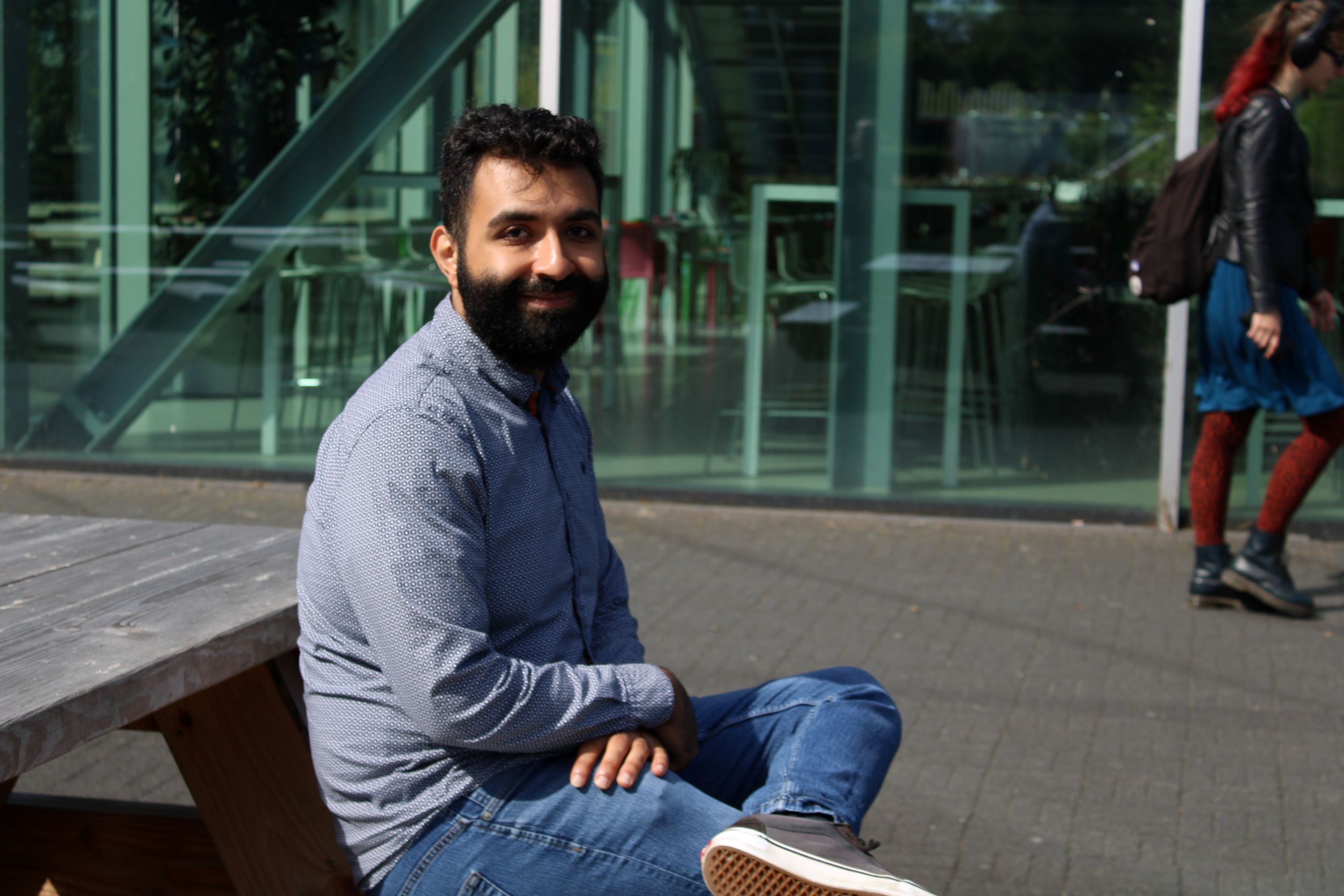
Lees verderAls je bij leerlingen het kwartje ziet vallen, voelt dat heel goed
Delân begon als student biologie. Hij kwam er tijdens een wiskundevak achter dat hij het dateen erg leuk vak vond, maar vooral dat hij het leuk vond om zijn vrienden daarmee te helpen. Hij heeft toen besloten om de educatieve minor te gaan doen, en was na zijn bachelor tweedegraads biologie docent. Al heel lang had hij als ‘back-up plan’ in zijn hoofd om wiskundedocent te worden. Omdat hij merkte dat hij wiskunde toch misschien wel leuker vond dan biologie, is hij na de bachelor biologie begonnen met de bachelor wiskunde.
‘Biologie is interessant, maar bij wiskunde kun je lekker puzzelen, dat vind ik heel leuk’, zegt Delân. Ook in de wiskundebachelor heeft hij de educatieve minor gedaan. Inmiddels is Delân klaar met zijn beide bachelors en werkt hij als wiskundedocent op het Maartenscollege, daarnaast doet hij in deeltijd de Master Science Education and Communication om ook zijn eerstegraads bevoegdheid als wiskundedocent te halen.
De combinatie van werk en studie vindt hij ‘intens’ maar ook heel leuk. Na 8 jaar studeren was hij er wel aan toe om te gaan werken, en hij leert nu veel meer dan in alleen een stage. Hij vindt het fijn dat het te combineren is met de master, maar het is wel druk. Hij werkt 3 dagen in de week als docent en studeert de andere 2 dagen. Maar vaak is hij daarmee niet klaar, en moet hij in de avonden en weekenden nog met werk en studie bezig. Lessen voorbereiden, nakijken en studieopdrachten maken kost veel tijd. Hij vindt het jammer dat hij daarom soms minder tijd aan een opdracht besteedt dan hij eigenlijk zou willen.
Eerst leek een baan als universitair docent hem leuk, maar hij is blij dat hij dat niet is gaan doen. Hij vindt het erg leuk om met jongeren te werken. ‘Als je bij je leerlingen het kwartje ziet vallen, voelt dat heel goed’, zegt hij, ‘vooral omdat veel leerlingen wiskunde als een moeilijk vak zien’.
Delân raadt aan om de minor te doen als je overweegt om docent te worden, of een ‘snuffelstage’ vak (bij FSE het vak “Oriëntatie op Onderwijs in de Bètawetenschappen”). Op die manier kan je kijken of het onderwijs echt wat voor je is. Volgens hem moet je geen docent worden alleen omdat je je vak heel erg leuk vindt, maar ‘omdat je het leuk vindt om je vak over te brengen en met jongeren te werken’. Delân waarschuwt ook; ‘docent zijn vereist soms wel veel geduld’.
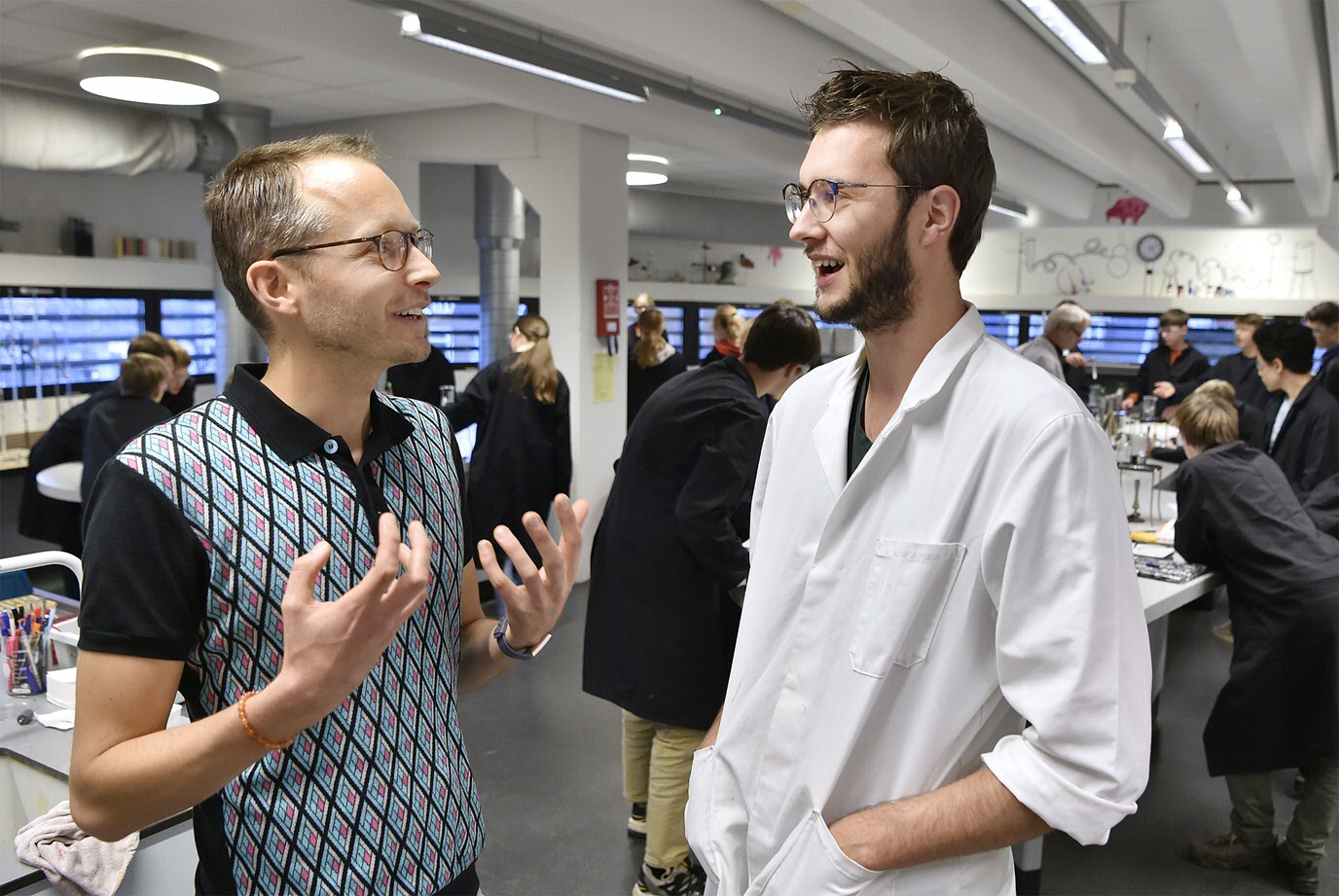
Lees verderMooi als mijn leerlingen leren dat ze dingen kunnen, al denken ze van niet
“Ik dacht er tijdens mijn bachelor al aan om voor de klas te gaan staan. De tweejarige master Educatie leek mij dan ook de meest logische stap.
Maar omdat het onderzoek dat ik deed voor mijn afstuderen zó leuk was, heb ik toch eerst de master technische natuurkunde afgemaakt. Na een tijdje in de ict te hebben gewerkt realiseerde ik me dat ik meer met mensen wilde werken.
Wat ik mooi vind aan het onderwijs is dat je écht contact
hebt met je leerlingen. Iedere leerling is een eigen persoon, die
aan het ontdekken is wat hij of zij belangrijk vindt. Het is leuk
als leerlingen enthousiast zijn over je vak en er goed in zijn,
maar het mooiste is als je ze weet te raken. Dat je ze iets mee kan
geven waar ze later iets aan hebben. Natuurkunde is best een
ingewikkeld vak, maar het mooiste is wanneer mijn leerlingen leren
dat ze dingen kunnen, ook al denken ze eerst van
niet.
Leraar zijn is een heel menselijk beroep en je doet veel op gevoel. Maar daarbij is het heel nuttig om theoretische kennis te hebben om je aanpak te onderbouwen. Dankzij deze master heb ik de middelen om in goede termen te beschrijven wat ik zie en ervaar.
Ik ben ontzettend toegewijd aan mijn leerlingen, en daar gaat soms wel tijd in zitten, maar omdat ik heel vrij ben in mijn planning bepaal ik zelf wanneer ik het druk heb. Natuurlijk ben ik gebonden aan lesuren en schoolvakanties, maar daarbinnen bepaal ik zelf hoe ik mijn lessen vorm geef en hoe ik mijn tijd indeel. Die vrijheid en het gevoel dat mijn werk er toe doet, maken mijn werk heel bevredigend.”
Cees Draaijer, docent natuurkunde op het Stadslyceum in Groningen
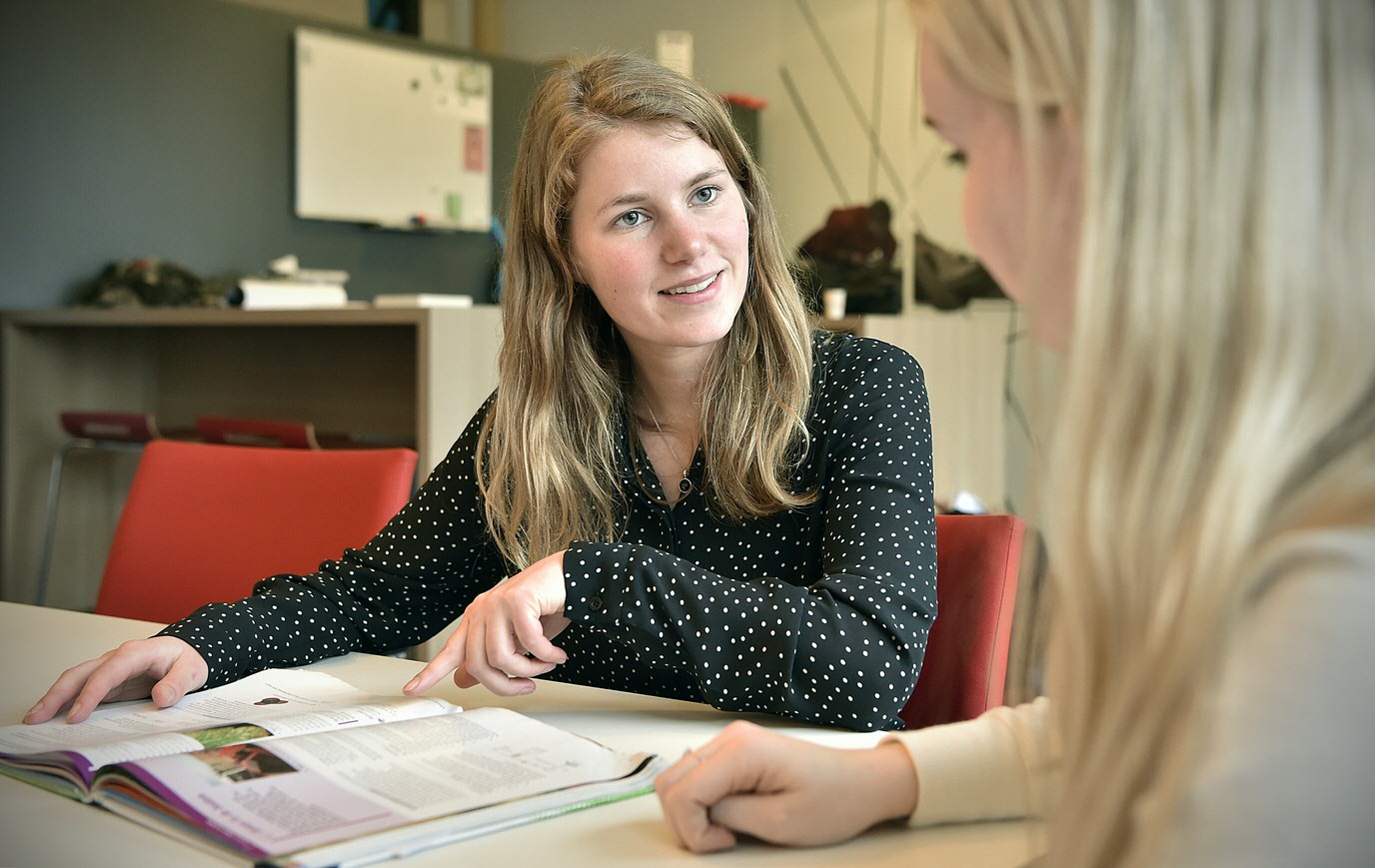
Lees verderDe lerarenopleiding past veel beter bij me
Ik loop op het moment stage op het Simon Vestdijk college waar ik Scheikunde en NASK aan VWO 2 en 4 geef. Het onderwijs trok mij altijd al: ik gaf al vaak bijles en examentraining, dus de lerarenopleiding was een logische stap. Maar omdat ik eerst wat breder wilde kijken, heb ik na mijn bachelor eerst de master Biologie gedaan. Ik kwam er eigenlijk al snel achter dat op het lab werken niet helemaal mijn ding is, dus ben ik daarna begonnen aan de Lerarenopleiding. En dat past veel beter bij me.
Noem het een soort idealisme, maar voor mij is het belangrijk dat ik iets bijdraag aan de wereld, en die kans heb ik als docent. Je speelt best een grote rol in het leven van een leerling, en je kunt een behoorlijke impact hebben. Dat maakt het spannend, maar het motiveert me ook.
Pubers zijn een ontzettend leuke doelgroep: ze denken soms dat ze al heel veel weten, maar ze zijn ook nog heel veel aan het ontdekken over zichzelf en over de wereld. En daardoor kun je, als je een goede docent bent, heel veel interesses en enthousiasme bij ze aanwakkeren. En dat is uiteindelijk wel waar ik energie uit haal: iets positiefs bij mijn leerlingen naar boven halen. Het is ontzettend fijn om te horen van mijn leerlingen dat ze iets begrijpen, vooral bij zo’n vak als Scheikunde.
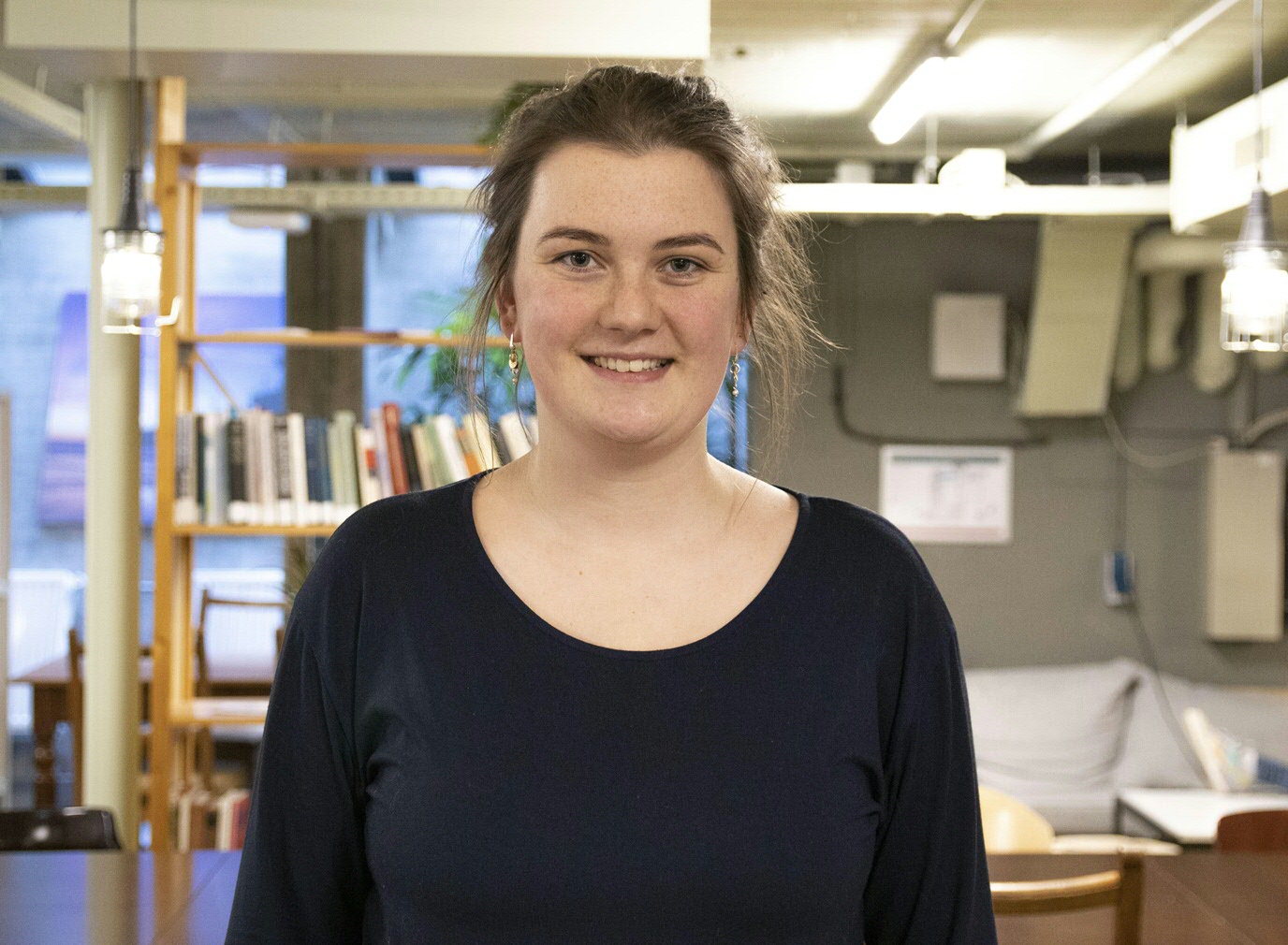
Lees verderOnderwijs is mooi omdat het de ogen van leerlingen opent
Ik ben Anike Knapper en ik zit in het tweede jaar van de master Communicatie en Educatie in de Bètawetenschappen. Als ik afstudeer, heb ik een eerstegraads bevoegdheid als docent biologie.
Biologiedocent leek me al heel lang leuk om te worden, omdat ik jonge mensen kan vertellen over hun eigen ontwikkeling, over hoe hun lichaam werkt, hoe we ons lichaam en alles om ons heen continu beïnvloeden en hoe we afhankelijk zijn van onze omgeving. Het onderwijs in het algemeen vind ik mooi, omdat alle verschillende vakken de ogen openen van leerlingen. Ze leren de wereld op veel verschillende manieren zien – op manieren die ze niet in hun eentje zouden ontdekken. Ik kan de leerlingen heel veel leren, en hen begeleiden, maar tegelijkertijd leer ik door de ogen van een leerling te kijken.
Bij de lerarenopleiding leer je onder andere over vakdidactiek: hoe pak je bepaalde leermoeilijkheden bij jouw vak goed aan? Je krijgt een beeld van wat het hele onderwijs is en leert hier ook kritisch naar te kijken. Er is veel begeleiding in jouw persoonlijke ontwikkeling tot docent doordat je een eigen vakcoach hebt op je stageschool. Samen met andere stagiaires deel je wekelijks lief en leed, bespreek je elkaars leerprocessen en help je elkaar volgende stappen te maken.
Al met al is het een persoonlijk leerproces in een vol programma, zodat je bij je afstuderen zelfverzekerd kunt starten als docent!